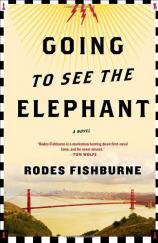Reading Group Guide
Discussion Questions
Going to See the Elephant

1. When we first meet Slater Brown, he is feverishly working on…nothing. What did you make of Slater’s burning need to write something without knowing what that something is? Did you interpret this as a sign of youthful foolishness or a natural desire for a talented young man? Did your opinion of Slater’s aspirations change throughout the novel?
2. Discuss the way that journalists are portrayed in Going to See the Elephant. What about politicians? How accurate did you find these depictions?
3. Early in the book, Slater reveals that he believes that a person who is destined to do something great will do so by age twenty-nine. Is there an age by which you believe great work, or great talent, should be demonstrated?
4. Consider the title, as well as the author’s note on the title, of this novel. What significance do you think the title has in the context of the story and characters of Going to See the Elephant?
5. What similarities do you see between Slater and Milo? What differences in their motivations?
6. Going to See the Elephant is set in a semi-realistic world. Why do you think the author made this choice? What did you feel the setting added to the reading experience?
7. Consider the question of fate versus action in this novel. Which characters seem to be driven by fate, and which take their destinies into their own hands? How much of our lives is controlled by outside forces and to what extent do actions determine fate?
8. Why do you think that weather becomes Milo’s obsession? What it is about controlling the weather that he finds so compelling?
9. On page 117, Slater says “Well you know what they say about stories. They find the people best suited to tell them.” Where do you see this being true in the world of this novel? Who tells what story, and why?
10. What is it that Slater sees in Callio upon their initial meeting? To what is he attracted? How does this change over time?
11. Discuss Havram’s relationship with his daughter. Is his anger toward Slater justified?
12. From what you are shown in the novel, do you think Slater is a good writer? Why or why not? Do you think his talents lie elsewhere? Will his newfound maturity help him accomplish his ambitious dream?
13. What is it that compels Slater to confide his secret to Callio? Did her reaction surprise you?
14. Throughout the novel, Slater is preoccupied with his legacy–doing something or creating something that will last. Do you think this is a common concern? What do you think this says about Slater as a character?
15. Consider Slater’s letter to Callio on page 259. How would you have reacted, were it written to you?
16. Did you like the ending of the novel? Why or why not?
Going to See the Elephant
- Publication Date: December 30, 2008
- Hardcover: 304 pages
- Publisher: Delacorte Press
- ISBN-10: 038534239X
- ISBN-13: 9780385342391







